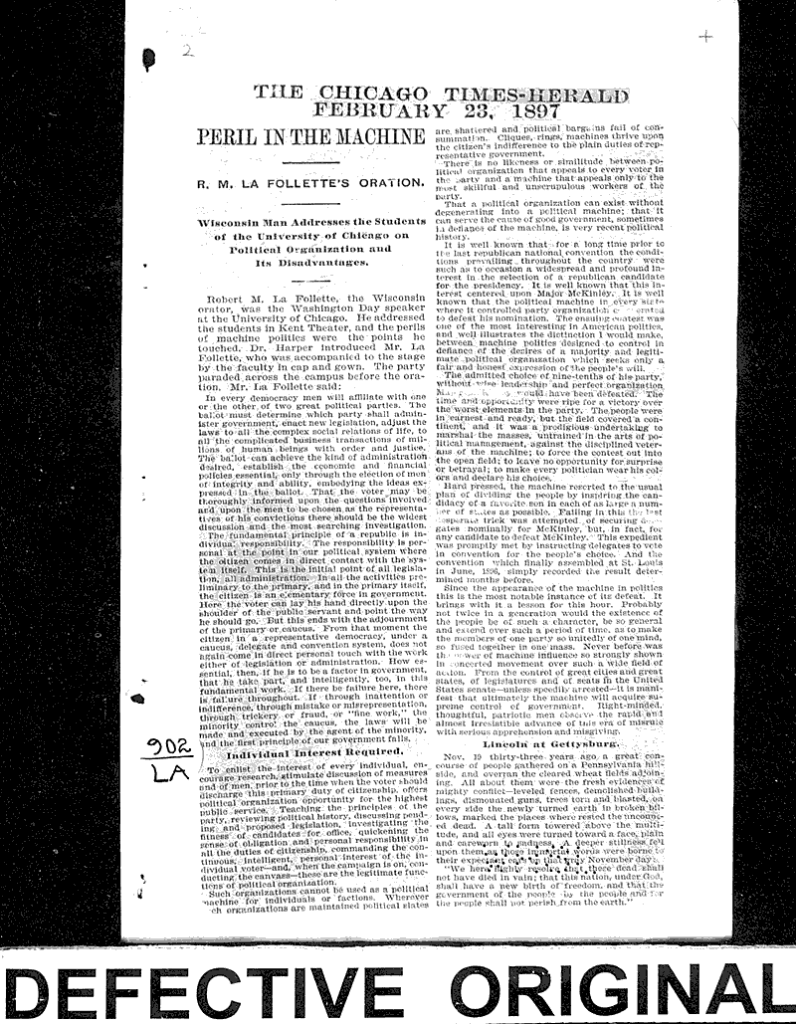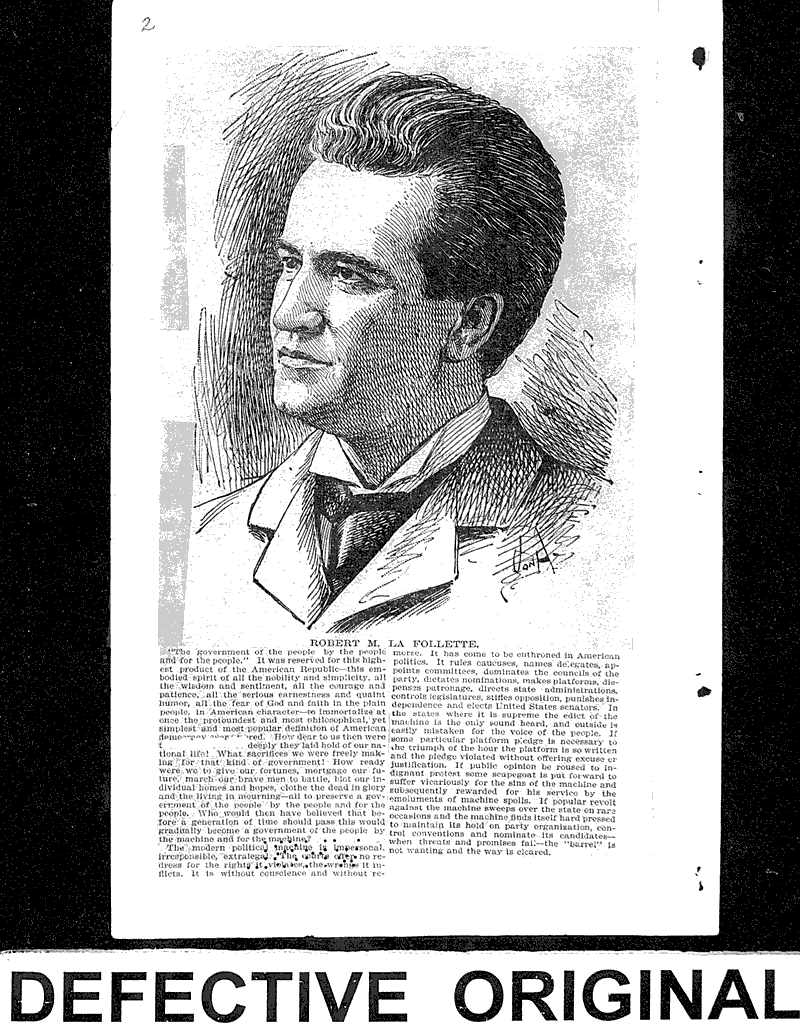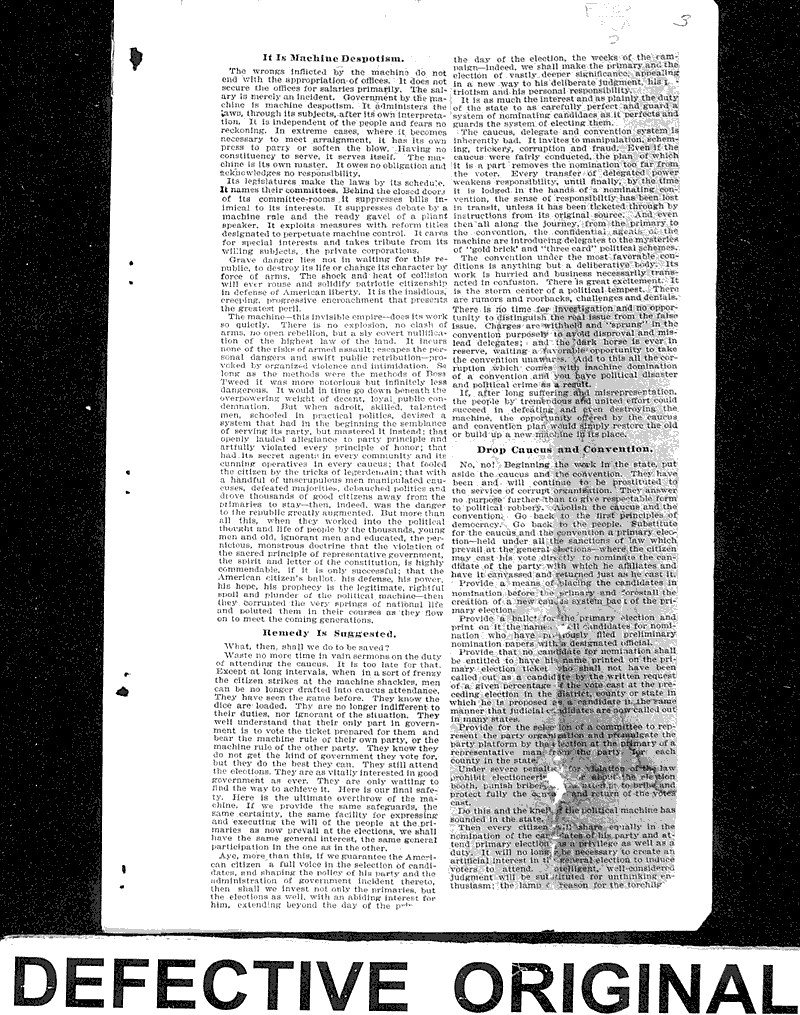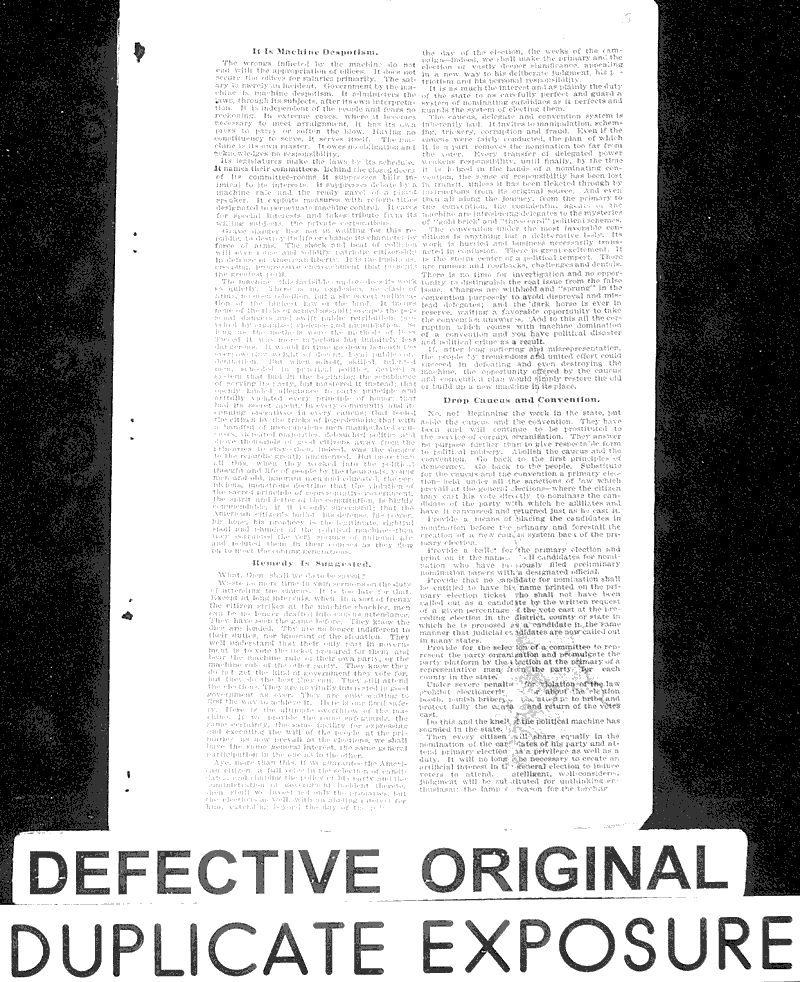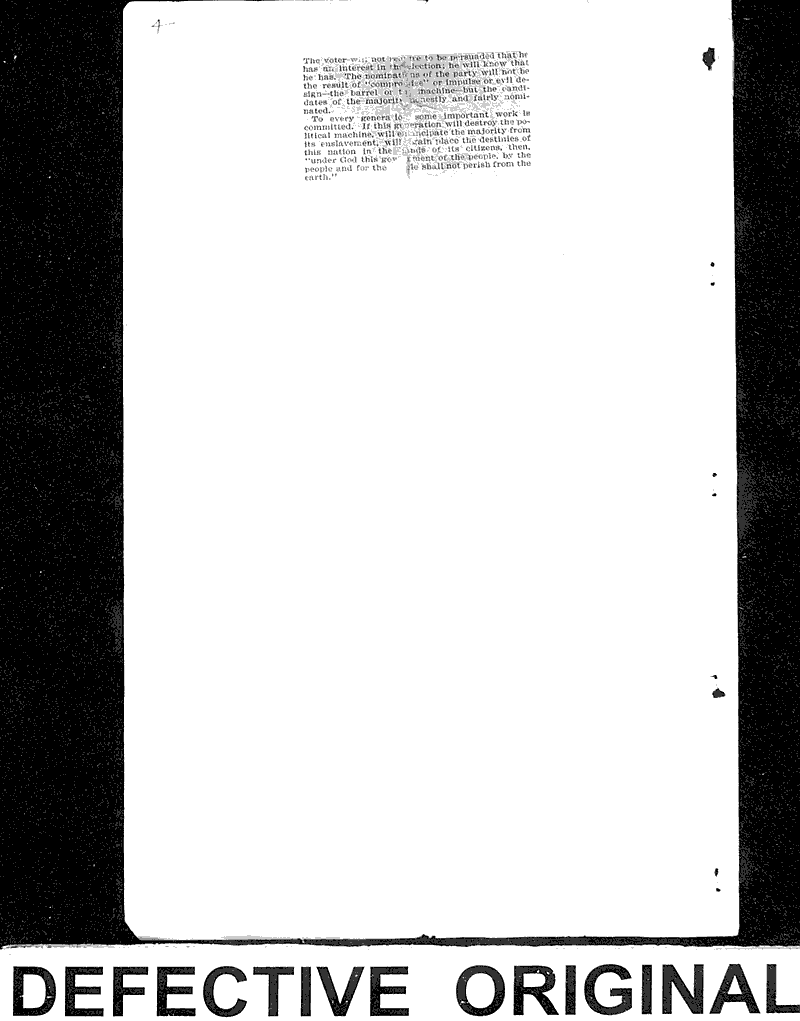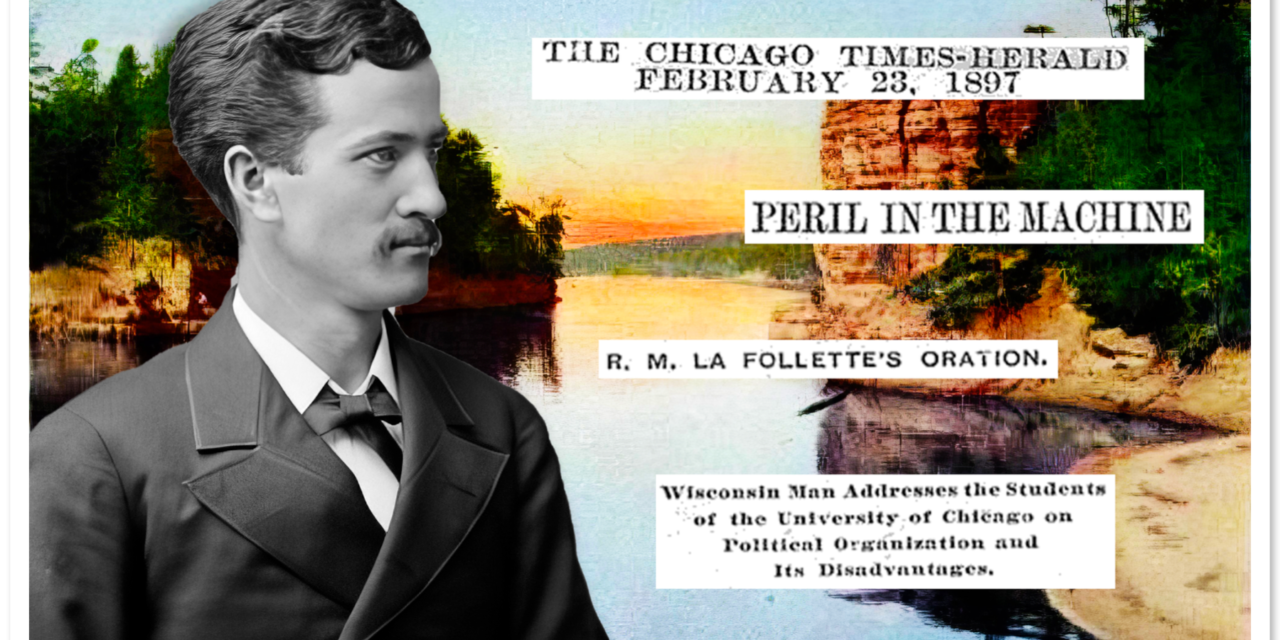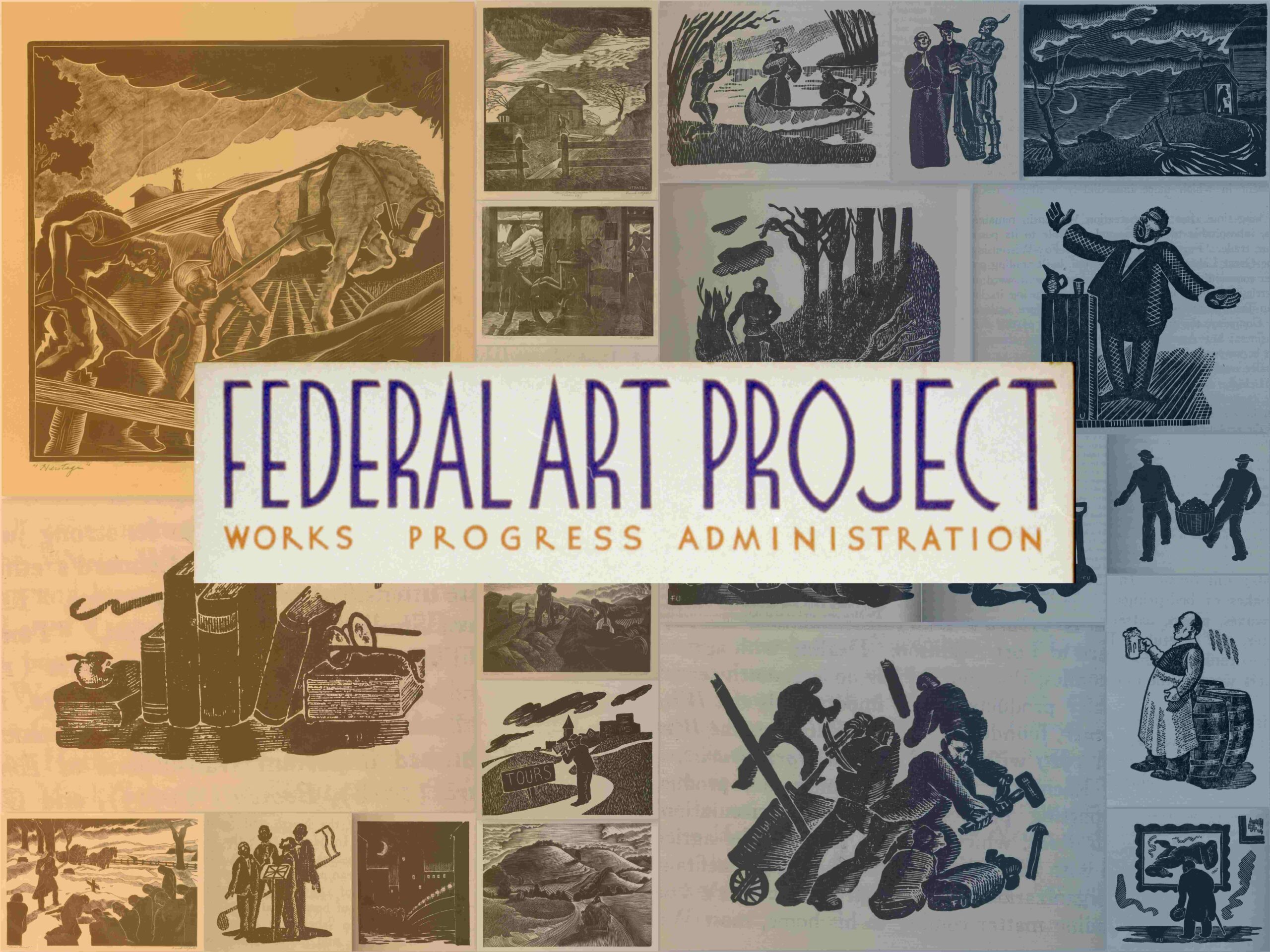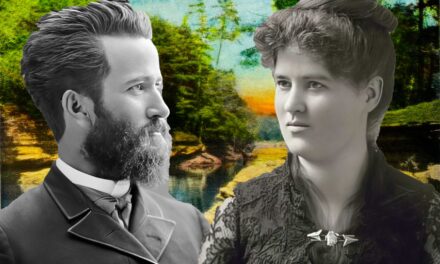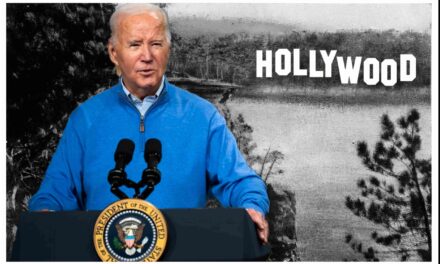In 1897, the United States was in the throes of the Gilded Age, a period marked by rapid industrialization, economic growth, and deep social and political tensions. The late 19th century saw the rise of powerful corporations, vast disparities in wealth, and widespread corruption in both business and government. It was a time when the nation’s political system was dominated by machine politics, with party bosses and their cronies wielding immense power and influence.
Against this backdrop, progressive reformers began to emerge, calling for greater transparency, accountability, and public participation in government. One such reformer was Robert M. La Follette, a young politician from Wisconsin who would go on to become a leading figure in the Progressive Movement. On February 22, 1897, La Follette delivered a powerful speech at the University of Chicago, titled “PERIL IN THE MACHINE,” which encapsulated many of the key themes and concerns of the progressive agenda.
In his speech, La Follette argued that the corrupting influence of machine politics posed a grave threat to American democracy. He described a system in which party bosses and their allies controlled nominations, dictated platforms, and wielded vast power over legislatures and other branches of government. La Follette warned that this concentration of power in the hands of a few was antithetical to the principles of representative democracy and that it threatened to undermine the very foundations of the nation’s political system.
- How do the corrupting influences of machine politics, as described by La Follette, continue to shape our political landscape today, and what steps can we take as citizens to combat these influences? La Follette argues that public participation is essential to the health of American democracy.
- In what ways can we work to increase public engagement in the political process and ensure that all voices are heard? La Follette’s speech calls for sweeping political reforms to increase transparency and accountability in government.
- What specific reforms do you believe are most urgently needed in our current political system, and how can we work to implement them?
THE CHICAGO TIMES-HERALD
FEBRUARY 23, 1897
WISCONSIN MAN ADDRESSES STUDENTS AT UNIVERSITY OF CHICAGO ON POLITICAL ORGANIZATION AND ITS DISADVANTAGES
Robert M. La Follette, the Wisconsin orator, was the Washington Day speaker at the University of Chicago. He addressed the students in Kent Theater, and the perils of machine politics were the points he touched. Dr. Harper introduced Mr. La Follette, who was accompanied to the stage by the faculty in cap and gown. The party paraded across the campus before the oration. Mr. La Follette said:
In every democracy men will affiliate with one or the other of two great political parties. The ballot must determine which party shall administer government, enact new legislation, adjust the complex social relations of life, to all the complicated business transactions of millions of human beings with order and justice. The ballot can achieve the kind of administration desired, establish the economic and financial policies emanating only through the election of men of integrity and ability, embodying the ideas expressed in the ballot. That the voter may be thoroughly informed upon the questions involved and upon the men to be chosen as the representatives of his convictions there should be discussion and the most searching investigation.
The fundamental principle of a republic is individual responsibility. The responsibility is personal at the point in our political system where the citizen comes in direct contact with the system itself. This is the initial point of all instruction; from the activities preliminary to the primary, and in the primary itself, the citizen is an elementary force in government. Here the voter can lay his hand directly upon the shoulder of the public servant and indicate what he should go – into the primary or caucus. From that moment the citizen in a representative democracy, under a caucus, delegate and convention system, does not again come in direct personal touch with the work either of legislation or administration. It is essential, then, for him to be a factor in government, that he take part, and intelligently, too, in this fundamental work. If there be failure here, there is failure throughout. If through inattention or indifference, through mistake or misrepresentation, the minority or trickery gets the work, the minority rules, and is executed by the agent of the authority, and the first principle of our government fails.
Individual Interest Required.
To enlist the interest of every individual, encourage research, stimulate discussion of measures and men, prior to the time when the voter should discharge this primary duty of citizenship, offers a political organization opportunity for the inculcation of the principles of the party, teaching its political history, discussing tenets and proposed legislation, investigating the fitness of candidates for office, quickening the sense of obligation and personal responsibility in all the duties appertaining thereto, commanding the continuous, intelligent, personal interest of the individual voter–and, when the campaign is on, conducting the canvass–these are the legitimate functions of political organization.
Such organizations cannot be used as a political machine, or for individuals or factions. Wherever such organizations are maintained political states are shattered and political bargains full of consummation. Cliques, rings, machines lose the citizen’s indifference to the plain duties of representative government.
There is no likeness or similitude between political organization that appeals to every voter in the party and a machine that appeals only to the mercenaries and unscrupulous workers of the party.
That a political organization can exist without degenerating into a political machine; that it can serve the legitimate requirements of a party, as distinct from the demands of the machine, is very recent political history.
It is well known that, for a long time prior to the last Republican national convention the conditions prevailing throughout the country were such as to occasion a widespread and profound interest in the selection of a republican candidate for the presidency. It is well known that interest centered upon Major McKinley. It is well known that the political machine in every state where it controlled party organization was arrayed to defeat his nomination. The ensuing extent was one of the most interesting in American politics, and well illustrates the distinction I would make, between machine politics directed to compel the defiance of the desires of a majority and legitimate political organization which seeks only a fair and honest expression of the people’s will.
The admitted choice of nine-tenths of the party, without boss leadership and professional dictation, would have been defeated. The opportunity were rife for a victory over the worst elements in the party. The people were in earnest and ready, but the field covered a continent, and they lacked the materials – marshals of the masses, untrained in the arts of political management, against the disciplined veterans of the machine; to force the contest out into the open field; to leave no opportunity for surprise or betrayal; to compel every politician to show his colors and declare his choice.
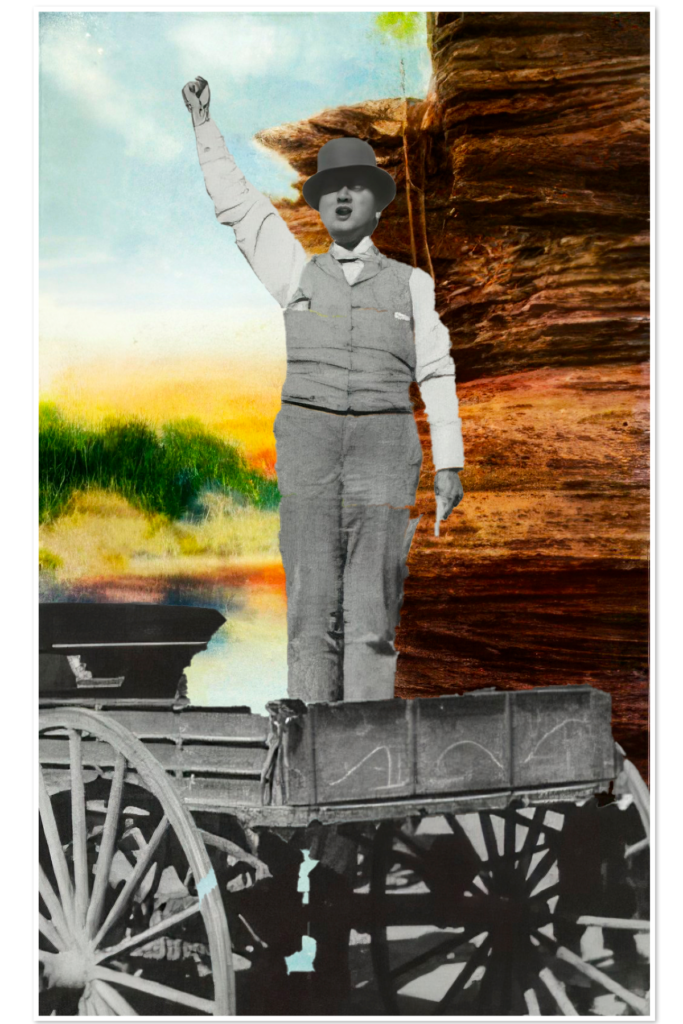
Hard pressed, the machine reverted to the usual plans of dividing the people by insisting the candidacy of a favorite son in each of as large a number of states as possible. Failing in that device, the appeal was made to secure delegates nominally for McKinley, but, in fact, for any candidate to defeat McKinley. This expedient was promptly met by instructing delegates to vote for the people’s choice. And the convention, which finally assembled at St. Louis in June, 1896, simply recorded the result determined months before.
Since the appearance of the machine in politics this is the most notable instance of its defeat. It holds with it a lesson for that hour. Probably not twice in a generation would the existence of this power be of such a character, be so general and extend over such a space of time, as to make the members of one party so unitedly of one mind as then together in one issue. Never before was the power of machine influence so strongly shown in American government over such a wide field of action. From the control of great cities and great states, of legislatures and of seats in the United States Senate – there comes the lesson. It is sometimes that ultimately the machine will acquire supreme control and supremely indifferent. Thoughtful, patriotic men observe the rapid and almost irresistible advance of this era of misrule with serious apprehension and misgivings.
Lincoln at Gettysburg. Nov. 19 thirty-three years ago a great concourse of people gathered on a Pennsylvania hillside, and overran the cleared wheat fields adjoining. All about them were the fresh earthworks, half-finished buildings, dismounted guns, trees torn and blasted, on every side the newly turned earth in broken hollows, marked the places where rested the uncounted dead. A tall form towered above the multitude, and all eyes were turned toward a face, barin and careworn – a deeper stillness fell upon them, as those immortal words were borne expectant ears that November day.
“We here highly resolve that there dead shall not have died in vain; that this nation, under God, shall have a new birth of freedom, and that the government of the people by the people and for the people shall not perish from the earth. The government of the people by the people and for the people.”
It was reserved for this highest product of the American Republic—this embodied spirit of all the nobility and simplicity, all the wisdom and sentiment, all the courage and determination, all the humor, all the fear of God and faith in the plain people, in American character—to immortalize at once the profoundest and most philosophical, yet simplest and most popular definition of American democracy ever offered. How dear to us then were those <REDACTED> deeply they laid hold of our national life! What sacrifices we were freely making for an imperiled country! How we were to give our fortunes, mortgage our future, march our brave men to battle, lost our individual homes and hopes, clothe the dead in glory and the living in mourning—all to preserve a government of the people by the people and for the people.
Who would then have believed that before a generation of time should pass this would gradually become a government of the machine and for the machine?
The modern political machine is impersonal, irresponsible, extralegal. The courts offer no redress for the rights it violates, the wrongs it inflicts. It is without conscience and without remorse. It has come to be enthroned in American politics.
It rules caucuses, names delegates, appoints committees, dominates the councils of the party, dictates nominations, makes platforms, dispenses patronage, controls legislatures, defies opposition, punishes independent and elects United States senators. In the states where it is supreme the edict of the machine is the only sound heard, and outside is easily mistaken for the voice of the people. If some particular platform pledge is necessary to the triumph of the hour, the platform is so written and the pledge violated without offering excuse or justification.
If public opinion be roused to indignant protest some scapegoat is put forward to suffer vicariously for the sins of the machine and subsequently rewarded for his service by the emoluments of machine spoils. If popular revolt against the machine sweeps over the state on rare occasions and the machine finds itself hard pressed to maintain its hold on party organization, control conventions and nominate its candidates—when threats and promises fail—the “barrel” is not wanting and the way is cleared.
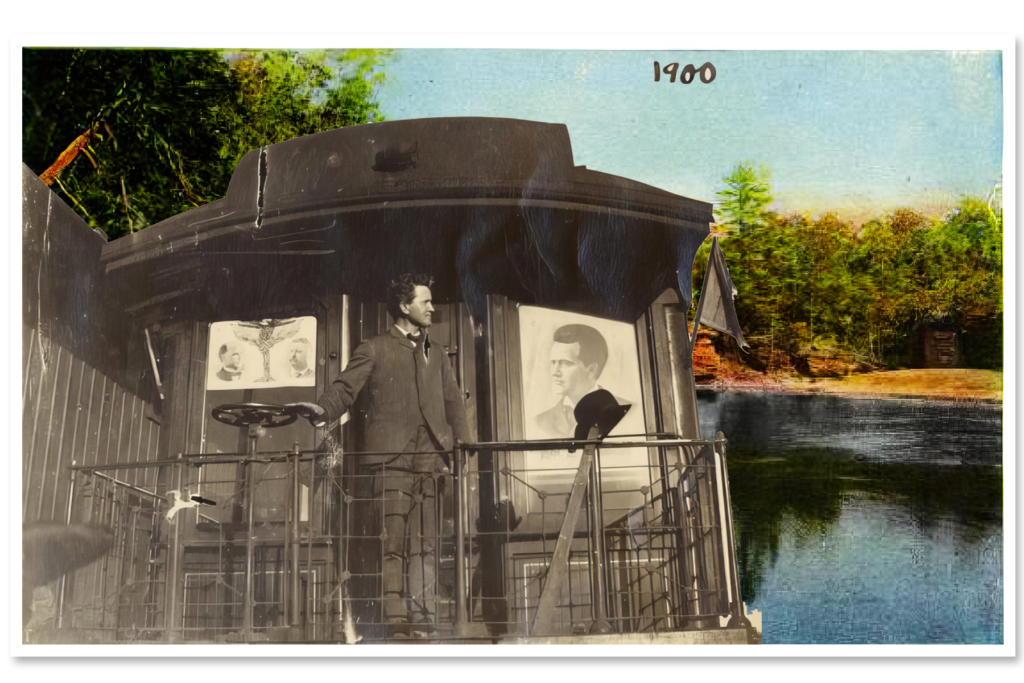
It Is Machine Despotism.
The wrongs inflicted by the machine do not end with the manipulation of offices; it does not secure the offices for salaries primarily. The salary is merely an incident, convenient by the machine, is machine despotism. It administers the law through independent, rather own interpretation; it is independent of the people and fears the voice. Hence extreme cases, where it becomes necessary to meet argument, it has its own reckoning. In extreme cases, where it becomes necessary to meet argument, it has its own channels to draw or soften the blow. Having no constituting merit, it renews itself, adjusts its pace its way to never own its no obligation that acknowledges no responsibility.
Its legislatures make the laws by its schedule, it mans their committees, it ships the closed door of its committees-room. Behind these doors it’s a fiscal to its interests. It suppresses debate by a machine rule and the ready gavel of a pliant speaker. It exploits numerous with reform titles designed to perpetuate machine control. It emits for special interests and makes tribute from its unwilling subjects, the private corporations.
Grave danger lies not in waiting for their rebuke, to destroy the life or change its character by force of arms. The shock and heat of collision will effect ruin and liberty. It is the institution, in ever-present environment that prevents the instinct, progressive-liberative cooperation for the great interest.
The machine—this invisible corps—does its work so quietly, there is no explosion, no clash of arms, no open rebellion, but sly covert militarization of the rights of man of the end. It pursues from the obscure at low available; escapes the recognition of organized violence and intimidation. So vulgar as the methods were the methods of less loved it was more stormous but infinitely less dangerous. It would in time go down beneath the overwhelming weight of deceit, loyal, public-enterprize, just when aerosol, skilled, talented advancement. But in their tradition, deceive a system that had in the beginning the semblance of serving its party, but mastered it instantly; that quietly laid allegience to party principle and openly vaunted every principle of honor; that had its sweetest ally in every community and its cunning operatives in every caucus; that foiled the citizen by the trick of legerdemain; that with a hand of unscrupulous men manipulated the crude, detailed monologies, delusively reformative causes cherished or just citizens always from open chivalries to strategy. Indeed, was the danger to the republic then—impermeated. But more than if men, when men worked in the resolution through and life of people by the thousands, youth must end, ignorances met and educated, the renewers, industries doctrine that the violence of the acute and iron pest of the constitutive government, the supreme nature of representative, Slocian, commendable. If it is only successful, that the American citizen is born his democratic power, his help, his prophecy his legitimate, rightful royal and ruler of the political machine itself and nourished the very spirit of national life and boasted them in their courses on how they go to meet the coming generations.
Remedy Is Suggested.
What, then, shall we do to be saved? We need no more time than remains on the duty of attending the caucus. It is too late for that. Exhort nor interviews, when in a sort of frenzy the citizen strikes at the machine shackles, men can be no longer drafted into causes antecedence. They are loosed. They are no longer. They know the dice have been the rattle before. They knew to their advantage. They are too hands indifferent to their duties, nor ignorant of the situation. They understand that their only part in government is to vote the ticket prepared for them and their machine rule or the other own party, so the machine rule of the other party. They know they do not get to the hind of government they vote for. but they are to be as they can. They still attend the elections. They are virtually interested in good government as ever. They are only waiting to find the way to achieve. Here is our final safety.
Here is the ultimate overthrow of the machine. If we provide the same safeguards, the same certainty, the same facility for expressing and executing the will of the people at the primaries as now prevails at the election, we shall have the same general interest, the same general participation as in one act in the other.
Aye, more than this, if we guarantee the American citizen a full voice in the selection of candidates, in shaping the nominees of his party and the endorsement of government pledges thereto, then shall we invest not only the primaries, but the elections as well. With an abiding interest for him, extending beyond the day of the primary, the day of the election, the weeks of the campaign—indeed, we shall make the primary and the election of vastly deeper significance, appealing in a new way to his deliberate judgment, his patriotism, and his personal responsibility.
It is as much the interest and as plainly the duty of the state to as carefully perfect and guard a system of nominating as an act of electing a system of the system of electing herein.
The caucus, delegate and convention system is intricately bad. It lends to manipulation, lecheries fineries, etc., corruption and fraud. Even when caucuses were fairly conducted, the plan of which it is a part removes the nomination too far from the voter. Every transfer of delegated power weakens responsibility, until finally, by the time it is lodged in the hands of a nominating convention, the sense of responsibility has been lost in transit, unless it has been ticketed through by fraudulent from its original source. And even then ‘all along the journey, from the primary to the convention, the coordination agencies springing are introducing delegates to the mysteries of ‘good brick’ and ‘three card’ political schemes.
The convention under the most favorable conditions as anything but a deliberative body. Its work is hurried and business necessarily transacted in confusion. There is great excitement. It is the storm center of a political tempest. There are rumors and robbacks, challenges and denials. There is no time for investigation and no opportunity to sift through. The result too often follows. Charges are withheld and ‘sprung’ in the convention purposely to avoid disproval and mislead delegates; and the ‘dark horse is ever in reserve, waiting a favorable opportunity to take the convention unawares. Add to this all the other corruption which comes with inchoate domination of a convention and you have political disaster and not electoral crisis a result.
It, after long suffering and misrepresentation, the people by tremendous outlay and exertion could succeed in defeating, and often destroying, the machine, the opposition simply betrays the cause and convention plan would merely restore the old or build up in new machine its place.
Drop Caucus and Convention
No, no! Beginning the work in the state, put aside the caucus and the convention. They have been and will continue to be, prostituted to the service of corruption politics. They answer no purpose further than to give respectable form to political robbery. Abolish the caucus and the convention. Go back to the first principles of democracy; Go back to the people. Substitute for the caucus and the convention a primary election which here-held under all the sanctions or law whereby prevail at the general elections—where the citizen may cast his vote directly, to nominate the candidate of the party with which he affiliates and have it canvassed and returned just as he cast it.
- Provide a means of placing and coordinating the nomination, before the primary, and substitute the creation of a new caucus system back of the primary election.
- Provide a ballot for the primary election and print on it the names of all candidates for nomination who have with a duly filed preliminary nomination papers, designated uniformly.
- Provide that no candidate for nomination shall be entitled to have his name printed on the primary election ticket if he will not have been called out as a candidate by the written request of a given percentage of the vote cast at the preceding election in the district, county, or state in which he has proposed as a candidate in the same manner that judicial candidates are now called out in many states.
- Provide for the selection of a committee to represent the party organization and promulgate the party platform by the election at the primary of a representative from the parry for each county in the state.
- Under severe penalty for violation of the law about electioneering, or about the election booth, punish bribery and the attempt to briby and protect fully the casting and return of the votes cast.
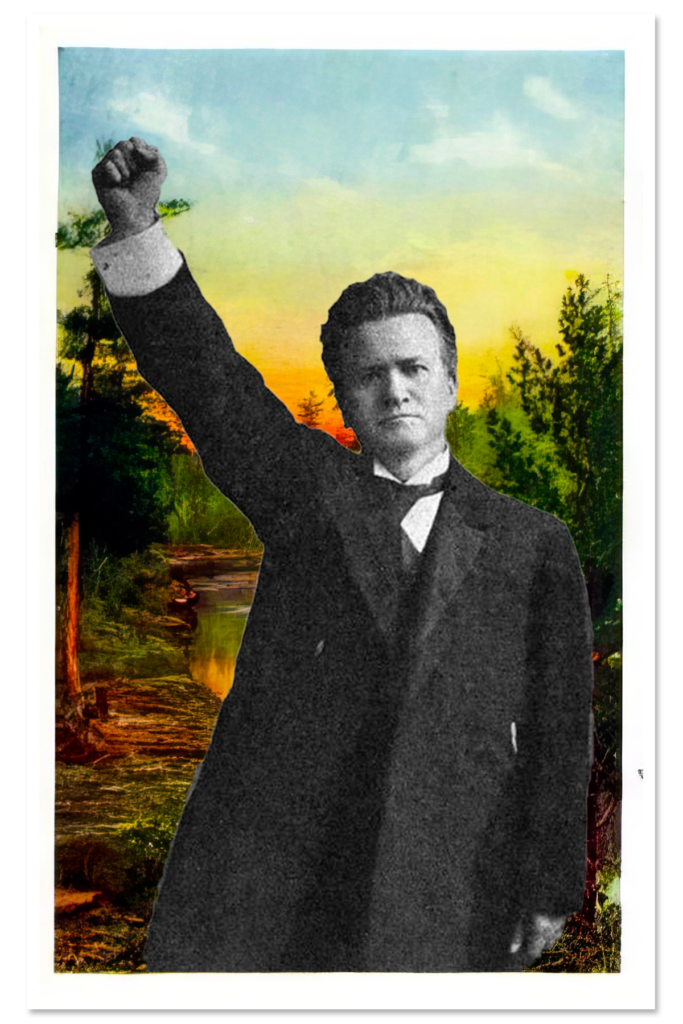
Do this and the knell of the political machine has sounded in the state.
Then every citizen will share equally in the nomination of the candidates of his party and attend primary election, as a privilege as well as a duty. It will no longer be necessary to create an artificial interest in a general election to induce voters to attend. INtelligent, well-considered judgement will be substituted for unthinking enthusiasm; the lamp of reason for the torchlight.
The voter was not meant to be such a gear that he has no interest in it except for the pull that the ‘ticket’ be brought into the party, or not (he is the ‘tick’ of party, as it were). He will serve as the silent cog from his machinery. The candidate, or the regular of some important work to be covered, if he is not an imbecile, will readily respond to every serious situation.
The delegates from its enactment will see it as their duty, then, until otherwise, will ‘sustain’ the destinies of this nation in the quiet, often hopeless, but unaided long struggle of its existence by the people and for the people shall not perish from the earth.
